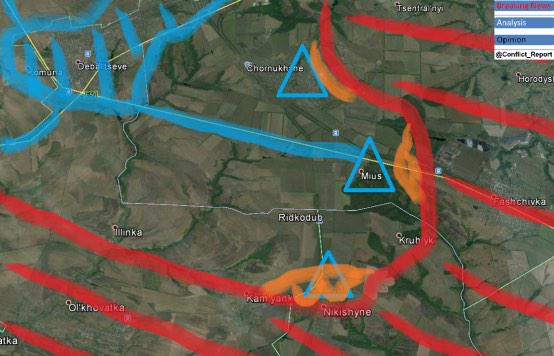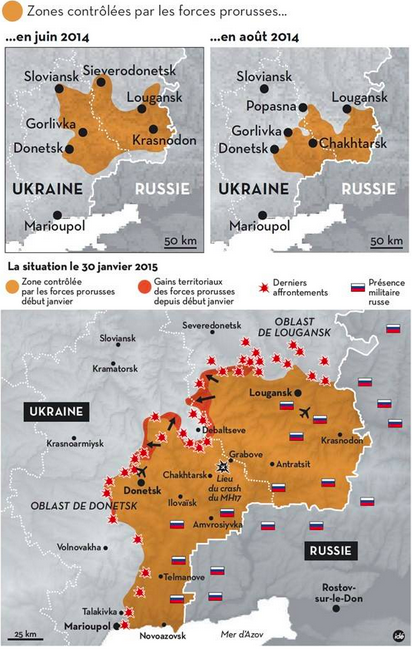by Brian Bonner
Ukrainian servicemen unload on Jan. 31 humanitarian aid brought by Ukrainian volunteers in Donetsk Oblast's Avdiyivka. Battles raged on Feb. 1 between government forces and pro-Russian rebels for control of a strategic transport hub as the death toll mounted in east Ukraine following the collapse of ceasefire talks. A group of U.S. foreign policy experts, meanwhile, released on Feb. 2 a report calling for $1 billion a year in military assistance to Ukraine for the next three years.
Several U.S. foreign policy experts, including former ambassadors to Ukraine Steven Pifer and John Herbst, are calling for America to provide $3 billion in military assistance to Ukraine in the next three years. The group also called on other NATO members to provide lethal defensive weapons and equipment to reverse what they call an "urgent and deteriorating" situation in eastern Ukraine, where Russia has been waging war since April.
The experts say they reached their conclusion because of the failure of diplomacy alone to secure a peace agreement from Russian President Vladimir Putin, who is arming, financing and training the separatists in eastern Ukraine and supporting them with Russian troops.
The entire report, formally released on Feb. 2, but distributed over the weekend, can be read here.
"There is no real ceasefire; indeed, there was a significant increase in fighting along the line of contact in eastern Ukraine in mid-January, with Russian/separatist forces launching attacks on the Donetsk airport and other areas," according to the report entitled "Preserving Ukraine's Independence, Resisting Russian Aggression: What the United States and NATO Must Do."

Debaltsevo situation: Ukrainians lose major defensive position at Nikishyne
The experts conclude that "Russian success would fatally undermine Ukraine's stability and embolden the Kremlin to further challenge the security order in Europe," possibly provoking a direct challenge to NATO. "Maintaining Western sanctions are critical but not by themselves sufficient. The West needs to bolster deterrence in Ukraine by raising the risks and costs to Russia of any renewed major offensive."
Besides Pifer and Herbst, the co-authors of the study include: Ivo Daalder, president of the Chicago Council on Global Affairs; Michele Flournoy, chair of the Center for a New American Security; Jan Lodal, distinguished fellow and former president of the Atlantic Council; James Stavridis, former Supreme Allied Commander Europe; Strobe Talbott, president of the Brookings Institution; and Charles Wald, former deputy commander of the U.S. European Command.
"Russia's actions in and against Ukraine post the gravest threat to European security in more than 30 years," according to the experts. "The West has the capacity to stop Russia. The question is whether it has the will."
The report reflects growing sentiment in the U.S. Congress and elsewhere to persuade U.S. President Barack Obama to supply Ukraine with lethal defensive weapons, something he has refused to do thus far but is authorized to do under the Ukraine Freedom Support Act approved by Congress last year. Its release comes as U.S. Secretary of State John Kerry is planning to visit Kyiv on Feb. 5 ahead of the annual international security conference in Munich, Germany.
The call for arming Ukraine underscores the failure of the Minsk peace process and enforcing the agreements reached on Sept. 5 and Sept. 19 for a cease-fire and withdrawal of armed forces and weapons to agreed-upon lines.
Minsk peace talks failed again on Jan. 31 and ex-Ukrainian President Leonid Kravchuk says that diplomacy has to take place in a new format because the Russian government refuses to take responsibility for the Minsk accords.
Ex-President Leonid Kuchma, who is part of the Ukrainian delegation in the Minsk talks, was quoted as saying that the Kremlin-backed separatists on Jan. 31 demanded that Ukrainian President Petro Poroshenko announce a unilateral cease-fire that reflects the situation on the ground -- with separatists expanding their control by some 550 square kilometers -- rather than the agreed-upon demarcation last September. If Poroshenko did not agree, the separatists threatened a full-scale offensive to make good on separatist leader Aleksandr Zakharchenko's claim to seize the entire Donetsk Oblast, EuroMaidan PR quoted Kuchma as saying.
All these signs are leading Western experts to conclude that Russia is not interested in a peace agreement under the Minsk terms and that it will continue to press its military offensive until it is stopped by Ukraine's troops.
"Even with enormous support from the West, the Ukrainian army will not be able to defeat a determined attack by the Russian military," the experts write in the report. "The more appropriate goal of Western military assistance should be to give the Ukrainian military additional defense capabilities that would allow it to inflict significant costs on the Russian military should the Russians launch new offensive operations, sufficient enough that Moscow will be deterred from further aggression."
The aim of the United States and NATO should be "to create a situation in which the Kremlin considers the option of further military action in or against Ukraine too costly to pursue."
The experts say that the level of aid called for by the Ukraine Freedom Support Act of 2014 -- $350 million in military assistance over the next three years -- is inadequate. It should be increased to $1 billion a year in 2015, 2016 and 2017 from the United States, the experts argue, will additional help coming from other NATO countries.
They call for the rapid delivery of weapons perhaps including:
* Counter-battery radars that can detect and locate the origin of multiple launch rocket system launches and artillery firings out to a range of 30-40 kilometers;
* Electronic counter-measures for use against opposing unmanned aerial vehicles, or drones;
* Supply of medium-altitude and medium-range unmanned aerial vehicles or drones to increae tactical situational awareness, identify opposing troop deployments and locate opposing multiple launch rocket systems; and
* Secure communications capabilities. Much Ukrainian tactical communication currently is conducted over non-secure radios or cell phones and thus is extremely vulnerable to interception by Russian intelligence-gathering systems;
* Armored humvees;
* Medical support equipment; and
* Light anti-armor missiles. "Ukrainian light anti-armor capabilities are severely lacking at a time when the Russians have moved larger numbers of tanks and armored personnel carriers into the Donbas."
The group calls for urgent action, fearing a new Russian offensive in April or May. According to the pro-Kremlin LifeNews on Feb. 2, the separatists are threatening to mobilize 100,000 men in the next 10 days, suggesting an even bigger invasion will take place soon by Russia.
The U.S. experts -- many of them with close ties to Obama -- also call on NATO members, particularly those with former Soviet/Warsaw Pact equipment and weapon systems similar with those operated by the Ukrainian military, to contribute those weapons to Kyiv.
"Some in the West are concerned that provision of military assistance, particularly of lethal arms, would cause Russia to escalate the crisis," the authors write. "We vehemently deny disagree. Russia has already continuously escalated: seizing and annexing Crimea, encouraging and aiding separatists in eastern Ukraine, providing the separatists with heavy arms and ultimately invading the Donbas with regular Russian army units...Enhanced military assistance would increase Kyiv's capability to deter further Russian escalation."
The experts also call on the U.S. and NATO to increase "intelligence coverage of the relatively small Ukrainian area of operations."
As a condition of the assistance, the authors call on the Ukraine government "to develop and implement a plan to integrate the volunteer battalions into -- and place them under command of -- regular army units and the National Guard as rapidly as possible."

The report concludes: "Should we delay action, the West should expect that the price will only grow. Should we not act more robustly, we can expect to face further Russian incursions, possibly including attempts to redraw borders elsewhere, and efforts to intimate former Soviet states into accepting Russian dominance."

No comments:
Post a Comment